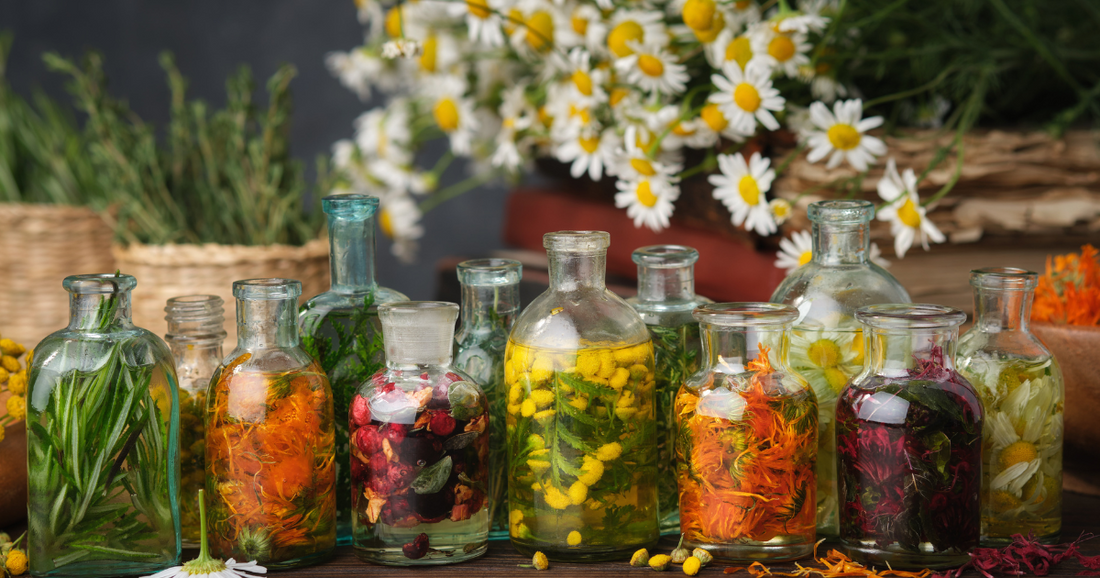
How to Use Herbs Properly: Fresh vs. Dried, Teas, Tinctures & More
Share
If you’re like me, you probably have a cupboard full of herbs—some dried, some fresh, maybe a tincture or two, and a few bottles of capsules you bought with good intentions. But here’s the thing: herbs aren’t one-size-fits-all. How you use them makes a huge difference in how effective they are.
I can’t tell you how many times I’ve heard someone say, “I tried herbs, but they didn’t work.” Nine times out of ten, it wasn’t the herb’s fault—it was how they used it. So, let’s break this down in a simple, no-fluff way so you can actually get the most out of your herbal allies.
Fresh vs. Dried Herbs: What’s the Difference?
Here’s the short version: both work, but you need to know how to use them.
- Fresh herbs are more potent in volatile oils (that’s the stuff that makes peppermint smell so minty or basil so aromatic). They’re fantastic for teas, cooking, or quick remedies. But they can spoil quickly and aren’t always available year-round.
- Dried herbs are easier to store, measure, and use consistently. Drying concentrates some properties, but certain delicate compounds (like those volatile oils) fade with time.
Quick tip: If you’re swapping one for the other in recipes or remedies, the general rule is: 1 part dried herb = 3 parts fresh herb. So if a recipe calls for 3 teaspoons of fresh, use 1 teaspoon dried.
Methods of Preparation: Teas, Tinctures, Capsules & More
So, how do you actually use herbs? Let’s walk through the most common methods and talk about their pros and cons.
Herbal Teas & Infusions
This is the classic way—and honestly, one of my favorites.
- Pros: Easy, affordable, and comforting. Perfect for everyday use.
- Cons: Not as strong as other methods, and you need to drink enough of it to really notice benefits.
Pro tip: Use a lid when steeping your tea. It keeps the medicinal oils from escaping with the steam.
Decoctions (a fancy word for simmering roots & barks)
When you’re working with tougher plant parts like roots, bark, or seeds, simmer them gently in water.
- Pros: Pulls out the deep, grounding medicine that won’t release in a quick steep.
- Cons: Takes more time, and you’ll usually want to make a batch instead of just one cup.
Tinctures
Herbs extracted in alcohol (or sometimes glycerin).
- Pros: Super concentrated, shelf-stable, portable, and fast-acting.
-
Cons: Taste can be… intense. Also, not everyone wants alcohol-based remedies so that's where glycerin comes in.
Capsules & Tablets
The “no fuss” option.
- Pros: Convenient, easy to dose, great for travel.
- Cons: Less connection to the plant, sometimes lower quality if you’re not careful about the brand.
Syrups
Usually made with herbs, water, and honey (like elderberry syrup).
- Pros: Kid-friendly, tasty, soothing.
- Cons: Shorter shelf life, especially if homemade.
Oils & Salves
For topical use—think skin healing, sore muscles, or even chest rubs.
- Pros: Great for external issues.
- Cons: Limited to skin-level benefits.
Which Form Should You Use?
Honestly, it depends on what you’re trying to do. If I’m dealing with a sore throat? Tea or syrup every time. If I need something strong and fast—like echinacea at the first sign of sickness? Tincture. If I’m traveling and want to keep my routine? Capsules.
There’s no “wrong” choice, but some forms are just better suited to certain needs.
Bringing It All Together
Here’s the bottom line: herbs are flexible. You don’t need to stress about choosing the “perfect” method. Start with what feels doable. Make a cup of tea. Try a tincture. Notice how your body responds. Over time, you’ll find what works best for you.
Herbal medicine is a relationship—it’s not just about popping something and moving on. It’s about listening, adjusting, and building consistency.
Don’t let the different forms overwhelm you. Think of it like cooking—sometimes you bake, sometimes you sauté, sometimes you just toss things in a pot and call it soup. Same ingredients, different results. Herbs work the same way.
So next time you’re wondering “tea or tincture?”—just remember, there’s more than one right answer.
And if you want personalized guidance on how to choose and prepare herbs for your unique body and health needs, I’d love to help. You can always reach out to me for a consultation, and we’ll build a plan that actually works for you.
